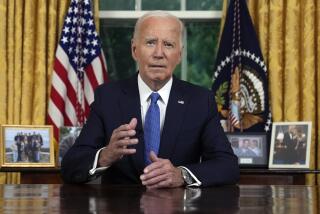Botha Yields, Calls Election Signaling End of His Rule
- Share via
JOHANNESBURG, South Africa — President Pieter W. Botha, giving in after a bitter power struggle within his own National Party, announced Thursday that he will schedule a general parliamentary election before early September, signaling the end of his 11-year rule.
The 73-year-old South African president, known for his stubborn and autocratic style, had ignored party calls for his early retirement last month and had vowed to extend the term of Parliament and remain in office until next year or longer.
But, abiding by the will of the party that has been his life’s work, Botha told a joint session of Parliament in Cape Town that he intends to dissolve Parliament next month and formally hand over “the seal of the republic” to a new president after the elections a few month later.
“This is the orderly and constitutional way,” Botha said.
Although he did not specifically announce his retirement, state-run radio said the president’s remarks “made it clear he did not intend to (seek) another term.”
The new National Party leader, Frederik W. de Klerk, the 53-year-old education minister, is Botha’s almost certain successor. Under South Africa’s system of government, which denies the black majority a vote in national affairs, the ruling white party controls the electoral college that selects a president. That ruling party will almost certainly be the National Party.
The announcement Thursday ended a political power play that began after Botha suffered a mild stroke Jan. 18. Two weeks later, he relinquished his post as leader of the National Party, where he began his political career 53 years ago as a 20-year-old political organizer.
As president and party leader, Botha had presided over the first cautious attempts to dismantle apartheid, the system instituted 40 years ago by his party. But his tenure was marred by more than two years of bloody racial violence, from 1984 to 1986, then a state of emergency that for nearly three years has sharply curtailed civil rights--and an international sanctions campaign.
An intuitive politician, Botha’s power grew throughout his two terms in office as did his reputation as an aloof, imperious leader who demanded total loyalty. Politicians called him “the Great Crocodile” for his fearsome temper, and he frightened away criticism from his supporters and wrathfully rejected it from outsiders as well.
For more than a decade in South Africa there was one constant: If P. W. wanted it to happen, it happened.
But, for the first time in his years as head of state, the party revolted against him.
The party selected De Klerk, a conservative Cabinet member, to replace Botha as party chief in a narrow victory over Barend du Plessis, the finance minister and Botha’s choice for the post.
In his first weeks as party leader, De Klerk impressed legislators by showing a greater willingness to listen to other views and by calling for an accelerated overhaul of the country’s race laws. However, De Klerk strongly supports separate neighborhoods and amenities for those who want them and opposes a one-person, one-vote system.
Botha’s step-by-step reform program had stalled with the increasing strength of the far-right Conservative Party, the official opposition in Parliament since 1987, whose members portray Botha’s reforms as a sellout to blacks.
Botha ignored the early rumblings of discontent in his party and, in a televised interview last month, criticized the party for suggesting that he step down. He said he would postpone legislative elections until early 1990.
The five-year terms of the president and Parliament expire in early September, but Botha could have extended both until March, 1990.
Party leaders had wanted an early election to capitalize on disarray among white liberals and diminishing support for right-wing Conservatives, who have been embarrassed by black consumer boycotts of towns they control.
A day after Botha’s TV interview, the party unanimously endorsed De Klerk as its choice for South Africa’s next president. The move amounted to a formal rebuke of Botha, and although it did not prevent him from remaining as president, he would have had a hard time getting his programs through Parliament without the party’s support.
Botha, then the minister of defense, swept to power in 1978 in the wake of a scandal in the Information Ministry. During his years in power, he removed numerous discriminatory laws, including the notorious “pass laws,” and he began a program to bring blacks into municipal politics.
He introduced the three-chamber Parliament, bringing Indians and people of mixed-race into national politics for the first time. In a famous speech defending that system, Botha bluntly told white South Africans to “adapt or die.”
But his reforms failed to win widespread support among the country’s black majority, which instead sought full voting rights and equality. After two years of political unrest, the government clamped down on protest with a state of emergency, and the United States and other countries applied sanctions to South Africa.
More to Read
Sign up for Essential California
The most important California stories and recommendations in your inbox every morning.
You may occasionally receive promotional content from the Los Angeles Times.














